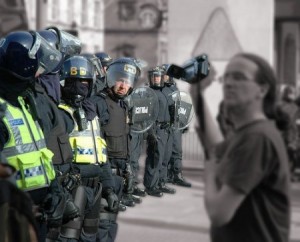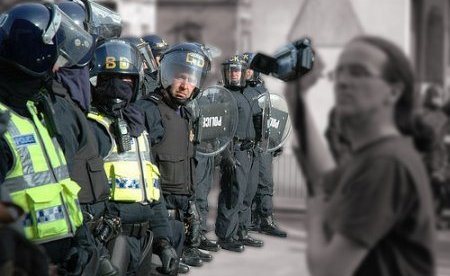Using the Internet to Police the Police
 The City of Chicago is no stranger to police misconduct lawsuits. The city spent $45.5 million in fewer than three years in cases involving beatings, taser attacks, unlawful detention, and the list goes on. A shortlist of officers was behind the payouts. Few made it to trial.
The City of Chicago is no stranger to police misconduct lawsuits. The city spent $45.5 million in fewer than three years in cases involving beatings, taser attacks, unlawful detention, and the list goes on. A shortlist of officers was behind the payouts. Few made it to trial.
On November 13, 2012, The Chicago Police Department was found guilty of covering up the beating of a female bartender by a city police officer, and was criticized for honoring a “code of silence” in which officers cover up for one another’s misdeeds. The case from 2007 resulted in an $850,000 federal jury verdict on behalf of Karolina Obrycka. Officer Anthony Abbate was caught on tape brutally battering Obrycka, a 24-year-old bartender at Jesse’s Shortstop Inn, after she refused to serve him any more drinks.
Obrycka’s attorney presented evidence of hundreds of phone calls between Abbate and other officers in the hours following the beating which convinced the jury that the cops were adhering to a “code of silence” to cover up the attack. The city of Chicago has said they will appeal the verdict.
When Abbate attacked Obrycka, he wasn’t on duty, he wasn’t doing police work, and he wasn’t using police powers. He was a drunk jerk who beat up a woman, and he happened to also be cop. To borrow a phrase from the Rodney King trials in California, it appears Abbate didn’t commit any of his crimes “under color of authority.” In some sense, Abbate’s barroom brawling has nothing to do with Chicago police in general.
But if Abbate’s buddies are trying to bribe and intimidate witnesses, we have a much bigger problem than one officer with a drinking problem and a propensity for violence. We are talking about a criminal conspiracy within the police department. There is also the question of why it took so long—almost a month—for Abbate to be arrested for the beating. Perhaps officers who took the complaint from Obrycka were understandably reluctant to investigate and charge one of their own. Well, for Superintendent Phil Cline and the rest of the Chicago police brass, the incident at the Jesse’s Shortstop Inn was not about an injured woman, rather, it was about an embarrassment to the department.
It appears that they were waiting to see how embarrassing this would turn out to be. The more press coverage, the more severely Abbate would have to be punished to prove that the department is tough on bad cops. Given that there is video of the incident all over the internet, it is clear that Abbate wasn’t going to get out of this easily. Shortly after the Shortstop Inn video hit airwaves, the charges against Abbate were upgraded from a misdemeanor to a felony.
Had the incident not been captured on video, Obrycka’s lawyer Terry Elk predicts that the case would never have made it through the courts. “If it became Karolina’s word against Anthony Abbate,” he told the Chicago Tribune, “this case would have gone nowhere.”
So what if more instances of police brutality were caught on tape?
There are huge movements on the internet today to use viral media to expose police misconduct worldwide, many of which were sparked by a viral video of a Stop and Frisk in NYC. In their heyday, the Black Panthers would do this. They had a police watch and would follow the police with a camera and record their actions. Now that so many people have cameras on their phones, it is a lot easier to hold the police accountable for their actions. The CATO Institute even suggests that the police should be required to record their most intense interactions with citizens.” Luckily for those of you who would like to participate in this movement to police the police, there are guidelines available online that give advice on how to properly (and legally) record police misconduct.

